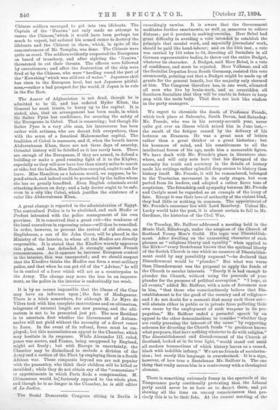On Tuesday, Mr. Balfour addressed a meeting held in the
Music Hall, Edinburgh, under the auspices of the Church of Scotland Young Men's Guild. His topic was Disestablish- ment. After dwelling on the unmeaning character of such phrases as "religious liberty and equality" when applied to the Kirk—" every Scotchraan knows that the spiritual liberty of the Scotch Church is one which no measure of Disestablish- ment could by any possibility augment "—he declared that Disendowment would be "plunder." But what was worse than Disendowment was the proposal to apply the funds of the Church to secular interests. "Surely it is bad enough to plunder the Church, without using the proceeds of your plunder for the purpose of political corruption." "I hope, at all events," added Mr. Balfour, with a note of fierceness new in him, "that those who conscientiously believe that Dis- establishment is for the good of the country and of religion— and I do not doubt for a moment that many such there are— will abstain either in public or in private from polluting their own cause by the employment of such weapons in its pro- pagation." Mr. Balfour ended a powerful speech by an appeal to the other denominations to consider "whether they are really pursuing the interest of the cause" by supporting schemes for diverting the Church funds "to goodness knows what purposes, that have nothing whatever to do with religion." The disestablishment and disendowment of the Church of Seotland, looked at in its true light, "would stand out amid all modern transactions of which history leaves us a record, black with indelible infamy." We are no friends of secularisa- tion; but surely this language is overstrained. It is a sign, however, of how true a Scotchman Mr. Balfour is. The one thing that really moves him is a controversy with a theological element.






































 Previous page
Previous page